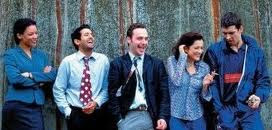This list of emotive efforts is compiled in order of release.
The Godfather (1972) – Nino Rota
Family
and honor. A certain sophistication and
panache. The ‘old country’. Rules and etiquette, and people who will not
hold back with if these are broken. All
in all, The Godfather.
Taxi Driver (1976) – Bernard Herrmann
Herrmann’s final score
invokes all his great Hitchcock ones from the past. The contrast of innocence and sleaze that the
movie revolves around (Travis Bickle’s childish naivety and his taste for
firearms and porno theatres; Jodie Foster’s world-weary but pubescent
prostitute) is clearly portrayed in this memorable piece.
The
Deer Hunter (1978) – Stanley
Myers
This is one of the most beautiful pieces of music ever written, period.
Chariots
of Fire (1981) – Vangelis
Nothing invokes victorious, slow-motion running like this slow-burning theme. The Sun newspaper has been milking it for their London 2012
Olympics coverage for months.
Local
Hero (1983) – Mark Knoppfler
Dire
Straits are a bit of a joke these days, used for
throwaway gags in the likes of Shaun of
the Dead (Simon Pegg’s Shaun has no qualms about lobbing one of their LPs
at marauding zombies). This
pisses me off, as they were one of the best British bands of the ‘80s – and
this haunting, gorgeous theme to Bill Forsythe’s wistful tale shows how
evocative they could be. Newcastle
United F.C. fans will know what I mean.
Crocodile
Dundee (1986) – Peter Best
Best’s
theme uses guitar, drum, and (notably) didgeridoo to create an outback
atmosphere that builds slowly and gets under your skin, working towards a
rousing climax. Strewth!
7. Dances
with Wolves (1990) – John Barry
You
can almost feel the wind blowing through your hair as you survey the vast open
frontier, the sun slowly setting across the flatland and bathing the scene in
an amber glow. Man I love this theme.
True
Romance (1993) – Hans Zimmer
I
should, by rights, be putting the music from Terrance Malick’s Badlands
('Gassenhauer' from the classical suite 'Musica Poetica' by Carl Orff) here
instead, seeing that Zimmer shamelessly rips it off. But then, True Romance is a pretty shameless
flick, and besides I’ve always thought that Badlands
is overrated. This theme is an oddly
innocent counterpoint to the carnage the film throws up, and reminds us that at
its core it is – aw, shucks! – just a sweet tale of love.
Braveheart
(1995) – James Horner
Nothing
like a good emotional piece of full-on orchestral music to deepen the impact of
an anti-English re-working of history.
Horner is really the best at this kind of epic, affecting score, and I
should also mention the ace dance remix that moved ravers on the dance
floor just as much in the late ‘90s.
Requiem
for a Dream (2000) – Clint Mansell
At
one point, this music was used to add a bit of drama to every reality show and
TV spot around. Don’t think any of those
featured heroin injections into abscesses or a dirty old man gleefully yelling
“Ass to ass!” (although feel free to correct me). Not to mention New Line ripped it off for thier The Lord of the Rings: the Two Towers trailer,
too. Not hard to see why, as it’s one of
the most powerful scores of modern times.



















